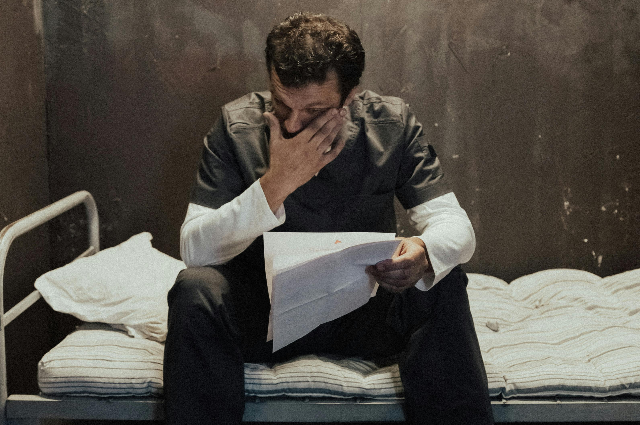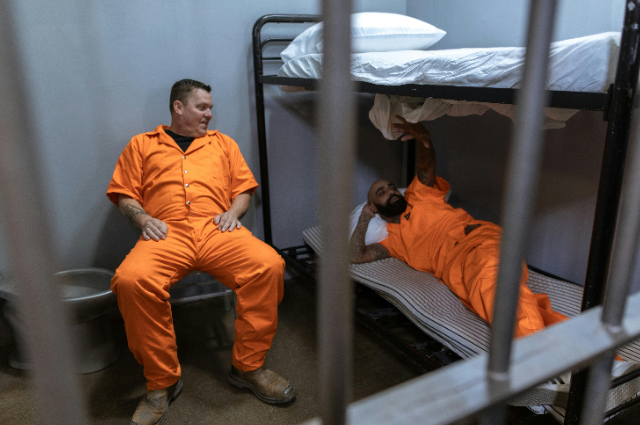
Introduction
Apart from the prevalent issues of physical abuse by guards and sexual assault on female prisoners in Indian prisons, there exists a largely overlooked yet concerning phenomenon: the chronic sexual exploitation of young prisoners by long-serving inmates. This exploitation is often done by those sentenced to life imprisonment or awaiting trial due to various delays in the legal process. Shared experiences from imprisoned youth shed light on the pervasive sexual tension and frustration experienced by attractive young prisoners. Hence, the tendency of prisoners toward homosexuality and dark heterosexual craziness is a significant issue. Some experts suggest that providing prisoners with opportunities for closer relationships with their spouses once a month could help decrease the problems and tensions related to homosexuality. To address this research gap, this essay delves into an in-depth examination of the effectiveness of current measures in meeting prisoners' sexual needs, the physiological duration of suppressing sexual desires, global approaches to this issue, and proposed policies aimed at mitigating this growing concern.
Sexuality of Prisoner's
The transition from corporal punishment to prison sentence as a form of punishment occurred during the 18th century by belief encapsulating the prison system as the process of 'reformation'. This is driven by societal desires for protection against the criminal behaviour of the person. Prisons fulfil this role by removing offenders from society, thus preventing them from committing further crimes. Additionally, society seeks justice as a payback for criminal actions. However, it has been acknowledged that the conditions within prisons, such as confinement and isolation, can dehumanize inmates. These environments often lead to feelings of anonymity and resentment due to societal rejection and condemnation. This is the context to analyse that, neglecting the sexual needs of prisoners not only fosters an environment risk for sexual tension and exploitation within facilities but also poses a significant risk to public safety upon their eventual release.
Humanism dictates prisoners should have the chance to spend private time with their families, highlighting the emotional and sexual frustration experienced by "innocent" spouses due to the separation caused by incarceration. However, opponents argue that society isn't morally obliged to grant inmates the privilege of sexual intimacy. They assert that it's an obvious consequence of incarceration that prisoners lose the opportunity for conjugal rights or to have children.
India in meeting the prisoner's sexual needs
India does not have any current measures in place specifically to meet the sexual needs of prisoners. However, there have been some developments that hint at potential changes, one of them is a landmark judgement from The Punjab and Haryana High Court in 2015, which acknowledged the right to procreate (having children) for prisoners as a fundamental right, subject to reasonable regulations by the state. This judgement implies that conjugal visits or alternative methods for procreation could be considered. In October 2023, Gurjeet Singh, a 60-year-old murder suspect who has been detained in Goindwal Jail in Tarn Taran district for the past few months, was granted conjugal visits by the northern state of Punjab, which made history as the first in India. He was granted permission to meet and spend a few hours alone with his wife. A 40-year-old prisoner serving a life sentence in Tamil Nadu's Tirunelveli district was granted permission by the Madras High Court in 2018 to spend two weeks at home for the "purpose of procreation." The judges even went to the extent of saying that conjugal visits were a right and not a privilege.
The Safe phycology Duration Of Suppressing Sexual Desires
The human experience is deeply intertwined with sexuality, a fundamental drive that shapes behaviour and emotions. Yet, within the stark walls of a prison, this core aspect of life confronts a unique set of challenges. Incarceration severs individuals from romantic partners and physical intimacy, leaving them to grapple with their sexual desires in a restrictive and often emotionally charged environment. This essay explores the complexities of sexual desire in prison, examining the factors that influence its intensity and the coping mechanisms employed by inmates to navigate this persistent urge.
The ability to manage sexual desires in prison hinges largely on individual differences. Biological factors like testosterone levels can influence sex drive, with some individuals experiencing a stronger urge than others. Psychological resilience also plays a crucial role. Those with a greater capacity for emotional regulation and frustration tolerance are better equipped to handle the absence of sexual fulfilment.
However, beyond individual predispositions, the prison environment itself shapes the experience of sexual desire. The lack of privacy and constant surveillance can make healthy outlets for sexual expression nearly impossible. Romantic relationships are severely restricted, and access to pornography is often limited or banned. This absence of a normal sexual outlet can lead to a heightened awareness of sexual urges, making them more difficult to suppress.
To cope with this persistent tension, inmates employ a variety of strategies. Suppression, a conscious effort to avoid thoughts and stimuli that trigger arousal, is a common approach. However, this strategy can be mentally taxing and ultimately unsustainable. Another outlet, though technically against prison rules, is autoeroticism (masturbation). While providing some physical release, it can be done under stressful and unhygienic conditions, diminishing its effectiveness. Fantasy serves as another coping mechanism, allowing individuals to find a form of sexual gratification through mental imagery.

Unfortunately, the current approach in most prisons often fails to address the underlying needs of inmates. A more realistic and comprehensive strategy is necessary. Educational programs on sexuality and stress management could equip inmates with healthier coping mechanisms. Additionally, increased access to mental health resources could provide them with a safe space to discuss their struggles and develop strategies for managing their desires.
Therefore, sexual desire in prison is a complex and multifaceted issue. Understanding the interplay between individual biology, psychological resilience, and the prison environment is crucial to developing effective solutions. By moving beyond a purely punitive approach and implementing more realistic strategies, we can ensure the well-being of inmates and potentially reduce the risk of unhealthy outlets like sexual violence within correctional facilities.
Probable policies from global Approaches
Addressing the sexual needs of prisoners is a complex issue that varies significantly across the globe. Different countries have adopted various methods to manage this aspect of incarceration, with some offering innovative solutions that prioritize the well-being and human rights of inmates.
1. Conjugal Visits in Brazil
In Brazil, conjugal visits are a well-established part of the prison system. These visits allow inmates to spend private time with their spouses or partners, providing an outlet for sexual expression and emotional connection. Research indicates that these visits can help reduce sexual tension within prisons and improve inmate behaviour and mental health. However, challenges include ensuring security during these visits and preventing abuse of the system.
In Brazil, prisoner visiting regulations differ from state to state and facility to facility. A prisoner has the right to visits from his "spouse, girlfriend, relatives, and friends," according to the national prison law, which expressly mentions visits in its enumerated list of rights. While visiting hours are subject to change, most prisons allow visitors to spend at least a few hours and in many, they can stay for almost the whole day with inmates. The largest prison in the nation, the Casa de Detenção in São Paulo, allows inmates to have visits for a half-day each week; the exact day and time of visitation depends on the pavilion in which the prisoner is housed. Inmates are permitted visitors on both days of the month's final weekend. The facility gets up to 30,000 visitors per weekend during the Christmas season, when visits are more common.
2. Special Housing Units for Married Couples in Germany
Germany takes a unique approach by offering special housing units for married couples where both partners are incarcerated. These units are designed to allow couples to maintain their relationship and provide emotional and sexual support to one another. The success of this program is reflected in the lower recidivism rates among participating inmates, as maintaining family bonds can play a crucial role in rehabilitation. The primary challenge lies in ensuring that these units do not become isolated from the rest of the prison population and maintaining strict eligibility criteria.
3. Self-Service Rooms in Austria
Austria offers self-service rooms where inmates can spend private time with their partners in a controlled and monitored environment. These rooms are available for several hours at a time, allowing inmates to engage in intimate activities in a more dignified setting. This approach has been praised for respecting the privacy and human rights of inmates while still maintaining necessary security measures. The success of this program is evident in its positive impact on inmate morale and behaviour. However, logistical issues such as room availability and scheduling can pose challenges.
4. Other nations and boarders.
Mississippi State Penitentiary, located in Parchman, is noted for being the first prison in the world to permit conjugal visits for inmates as early as 1900. These visits were initially introduced as an incentive to encourage hard work and good behavior among prisoners working on the penitentiary’s cotton plantations. As of the 21st century, several jurisdictions worldwide have adopted similar practices. In the United States, at least six states, including California, Connecticut, New York, Washington, and New Mexico, allow inmates to receive conjugal visits. These programs are designed to maintain family connections and support the rehabilitation process.
Internationally, countries such as Spain, France, Sweden, Denmark, Switzerland, Germany, Greece, Russia, Canada, Brazil, the Philippines, Turkey, and Belgium have also implemented conjugal visit programs in their prisons. In Africa, Kenya, Egypt, and Tanzania have allowed such visits under specific conditions. In Tanzania, the conjugal visit program was officially announced in 2012, marking a progressive step in the country’s correctional system. However, this initiative was short-lived; it was discontinued in 2018 following a directive from the new political regime, which decided to halt the program.

These programs vary widely in terms of regulations and frequency. For instance, in Canada, conjugal visits can last up to 72 hours and are available every two months, whereas in Spain, prisoners may receive up to 40 days of conjugal visits annually. The primary goals of these visits are to strengthen family bonds, reduce recidivism rates, and support the emotional well-being of incarcerated individuals.
Practical Analysis of Success Rates and Challenges
Overall, these programs have shown varying degrees of success in addressing the sexual needs of prisoners. Conjugal visits and specialized housing units have been associated with reduced sexual violence within prisons, improved mental health, and stronger family bonds. However, implementing such programs requires careful consideration of security measures, potential for abuse, and ensuring equality of access for all inmates.
Convention Against Torture and Other Cruel, Inhuman or Degrading Treatment or Punishment (CAT):
The Convention Against Torture (CAT) is an international human rights treaty that aims to prevent torture and other cruel, inhuman, or degrading treatment or punishment. While CAT does not explicitly address the sexual needs of prisoners, it establishes a framework for ensuring the humane treatment of all individuals in detention. Under CAT, states are obligated to prevent acts of torture and inhumane treatment, which can be interpreted to include the severe neglect of inmates' basic human needs, including sexual health.
Application to Prisoner Sexual Needs
Neglecting the sexual needs of prisoners can lead to severe psychological and physical consequences, potentially amounting to inhumane treatment under CAT. Ensuring that prisoners have access to means of sexual expression and intimate contact, within reasonable limits, aligns with the principles of humane treatment and dignity enshrined in the convention. Additionally, programs addressing sexual needs can help reduce the incidence of sexual violence and exploitation within prisons, contributing to a safer and more humane environment for all inmates.
Other international standards, such as the United Nations Standard Minimum Rules for the Treatment of Prisoners (the Nelson Mandela Rules), emphasize the importance of respecting the inherent dignity and value of prisoners. These rules advocate for conditions that support the physical and mental health of inmates, which can be interpreted to include provisions for addressing their sexual needs. Addressing the sexual needs of prisoners is a multifaceted issue that requires a balance between security, dignity, and human rights. By examining global approaches and aligning with international standards, countries can develop effective and humane strategies to support the well-being of inmates while maintaining order and safety within correctional facilities.
Impact and Risks
Mental and Physical Health:
Suppressing sexual desire for long periods can have significant psychological and physical consequences for inmates. The deprivation of sexual activity and intimacy can lead to a range of mental health issues, including increased levels of depression, anxiety, and stress. The lack of a healthy outlet for sexual expression may also contribute to heightened frustration and aggression among prisoners.
Psychological Consequences:
- Depression and Anxiety: The inability to engage in intimate relationships can exacerbate feelings of loneliness and isolation, leading to severe depression and anxiety. These conditions can be further aggravated by the already stressful prison environment.
- Aggressive Behaviour: Unmet sexual needs can lead to increased irritability and aggression, which can manifest in violent behaviour towards fellow inmates or even prison staff. This aggressive behaviour can disrupt the overall safety and order within the prison.
- Emotional Dysregulation: The continuous suppression of sexual desires may impair inmates' ability to manage their emotions effectively, leading to emotional outbursts and other forms of maladaptive behaviour.

Physical Consequences:
- Sleep Disorders: The stress and frustration associated with unmet sexual needs can contribute to sleep disturbances, impacting inmates' overall physical health.
- Psychosomatic Symptoms: Chronic stress and anxiety can manifest physically, leading to symptoms such as headaches, gastrointestinal issues, and weakened immune responses.
- Risky Sexual Behaviors: In the absence of healthy outlets for sexual expression, some inmates may engage in risky sexual behaviors, including non-consensual activities, which can result in the spread of sexually transmitted infections (STIs) and other health complications.
Recidivism Rates:
Addressing the sexual needs of prisoners has the potential to contribute to lower recidivism rates upon release. Studies suggest that maintaining family ties and intimate relationships can play a crucial role in successful reintegration into society. Programs that allow for conjugal visits or other forms of intimate contact can strengthen family bonds, providing inmates with a support system that is essential for their rehabilitation and reducing the likelihood of reoffending.
Results of study
Inmates who can maintain close relationships with their spouses and families are more likely to have a stable support network upon release, which can aid in their rehabilitation and reduce the risk of recidivism. Programs that address sexual needs can lead to improved behaviour within the prison, as inmates are less likely to engage in aggressive or disruptive activities when their emotional and sexual needs are met. Addressing sexual needs can improve inmates' mental health, making them more receptive to rehabilitation programs and increasing their chances of successful reintegration.
Alternatives to Conjugal Visits
- Technological Solutions:
Technological advancements provide potential solutions for maintaining sexual connections between inmates and their partners. Video conferencing, for example, can offer a controlled and monitored method for intimate communication, helping to mitigate the risks associated with physical conjugal visits.
- Video Conferencing:
Inmates can use secure video conferencing systems to have private conversations with their partners. While not a complete substitute for physical intimacy, this can help maintain emotional and sexual connections.
- Virtual Reality (VR):
Emerging technologies such as virtual reality could provide immersive experiences that help inmates feel more connected to their partners, though this approach is still in its experimental stages.
Video conferencing reduces the risk of contraband smuggling and security breaches associated with physical visits. This method can be more easily scaled to accommodate a larger number of inmates, making it a more inclusive option. Providing inmates with private, hygienic spaces for private video calls with their loved ones can offer a safe and controlled outlet for sexual expression. These facilities can help reduce sexual tension and the associated risks of aggression and mental health issues. Designated areas where inmates can masturbate privately can help maintain hygiene and provide a sense of dignity. Ensuring that these spaces are clean and safe can prevent the spread of infections and other health issues.
Allowing inmates to engage in masturbation in a private and hygienic environment can help reduce anxiety and frustration. Providing a controlled outlet for sexual expression can reduce the likelihood of aggressive behaviour and improve overall prison safety. Addressing the sexual needs of prisoners through various approaches can have significant benefits for their mental and physical health, reduce recidivism rates, and improve the overall environment within correctional facilities. Exploring alternatives such as technological solutions and masturbation facilities offers practical and humane ways to meet these needs while maintaining security and order.
Social and Religious Considerations
1. Public Opinion
In India, addressing the sexual needs of prisoners is likely to encounter significant resistance due to deep-rooted cultural and religious values. Indian society traditionally holds conservative views on sexuality, and these are often reflected in public attitudes towards policies that might appear to condone or facilitate sexual activity within prisons. For instance, a 2015 Pew Research Center survey found that 67% of Indians believed homosexuality should not be accepted by society. This conservatism extends to broader discussions on sexuality, particularly in contexts perceived as morally sensitive, such as prisons.
Religious beliefs also play a crucial role in shaping public opinion. Hinduism, the predominant religion in India, has complex views on sexuality, emphasizing celibacy in certain contexts, such as within the ascetic tradition. Meanwhile, Islamic teachings, which also influence a significant portion of the Indian population, typically advocate for sexual relations only within the bounds of marriage. These religious perspectives contribute to societal resistance against policies addressing prisoner sexual needs, as such policies may be seen as contradicting moral and religious standards.
2. Role of Rehabilitation
Addressing the sexual needs of prisoners can significantly contribute to rehabilitation goals. Research has shown that fulfilling basic human needs, including sexual needs, can improve mental health, reduce aggression, and promote better social behavior among inmates. For instance, a study published in the International Journal of Offender Therapy and Comparative Criminology found that prisoners who had access to conjugal visits exhibited lower levels of prison misconduct. By addressing sexual needs, prisons can create a more stable environment conducive to rehabilitation, ultimately aiding in the reintegration of inmates into society.
Logistical Considerations
Implementing policies to address sexual needs in prisons involves numerous logistical challenges. Staffing is a primary concern, as additional personnel may be required to monitor and facilitate conjugal visits while ensuring the safety and security of all involved. Security measures must be stringent to prevent the abuse of such policies, such as smuggling contraband or facilitating illicit activities.
Moreover, the infrastructure of many Indian prisons is not designed to accommodate private spaces for conjugal visits. Renovating existing facilities or constructing new ones would require significant financial investment and careful planning. An example of such logistical challenges can be seen in the United States, where only a few states have managed to implement conjugal visit programs despite recognizing their benefits, largely due to resource constraints and security concerns.
Monitoring and Evaluation
Effective monitoring and evaluation mechanisms are crucial to ensure that policies addressing sexual needs achieve their intended goals without unintended negative consequences. Regular assessments should be conducted to evaluate the impact of these policies on prisoner behavior, recidivism rates, and overall prison environment.
Feedback from both inmates and prison staff can provide valuable insights into the program's effectiveness and areas needing improvement. Additionally, independent oversight bodies could be established to conduct audits and ensure transparency. For example, in Canada, the effectiveness of conjugal visit programs is monitored through a combination of internal assessments and external reviews by correctional oversight agencies.
Some other aspects I consider significant...
1. Gender Issues
Female prisoners face specific challenges regarding sexual needs and exploitation. Women in prison are often more vulnerable to sexual abuse and exploitation by both fellow inmates and prison staff. Addressing sexual needs in women's prisons requires a gender-sensitive approach that prioritizes safety and consent. For instance, the United Nations Bangkok Rules emphasize the need for gender-specific healthcare and protection measures for female prisoners, highlighting the importance of addressing sexual and reproductive health needs in a safe and supportive manner.
2. LGBTQ+ Inmates
LGBTQ+ prisoners face unique challenges in a predominantly heterosexual prison environment. They are at higher risk of sexual violence and discrimination, making it essential to implement policies that protect their rights and address their specific needs. Creating inclusive policies that recognize and respect the sexual identities and needs of LGBTQ+ inmates can help mitigate these risks. The UK has made strides in this area by establishing dedicated units for transgender prisoners and implementing anti-discrimination training for staff.
3. Role of Prison Staff
Training prison staff is critical in managing sexual issues within prisons and preventing exploitation. Staff should be trained to handle conjugal visit programs sensitively and professionally, ensuring that these visits are conducted in a manner that respects inmates' dignity and privacy. Additionally, training should focus on recognizing and preventing sexual abuse and exploitation, fostering a safer prison environment. For instance, the PREA (Prison Rape Elimination Act) in the United States mandates regular training for prison staff on preventing, detecting, and responding to sexual abuse, which could serve as a model for other countries.
Conclusion
Addressing sexual needs in prisons is a complex issue that requires careful consideration of social, religious, and logistical factors. While there are significant challenges, the potential benefits for inmate rehabilitation and overall prison stability make it a worthwhile endeavour. By implementing thoughtful, well-monitored policies that address the specific needs of all prisoners, including women and LGBTQ+ individuals, and ensuring proper staff training, prisons can better support the rehabilitation and reintegration of inmates into society.
